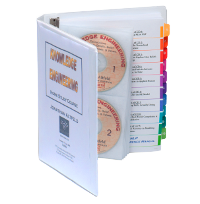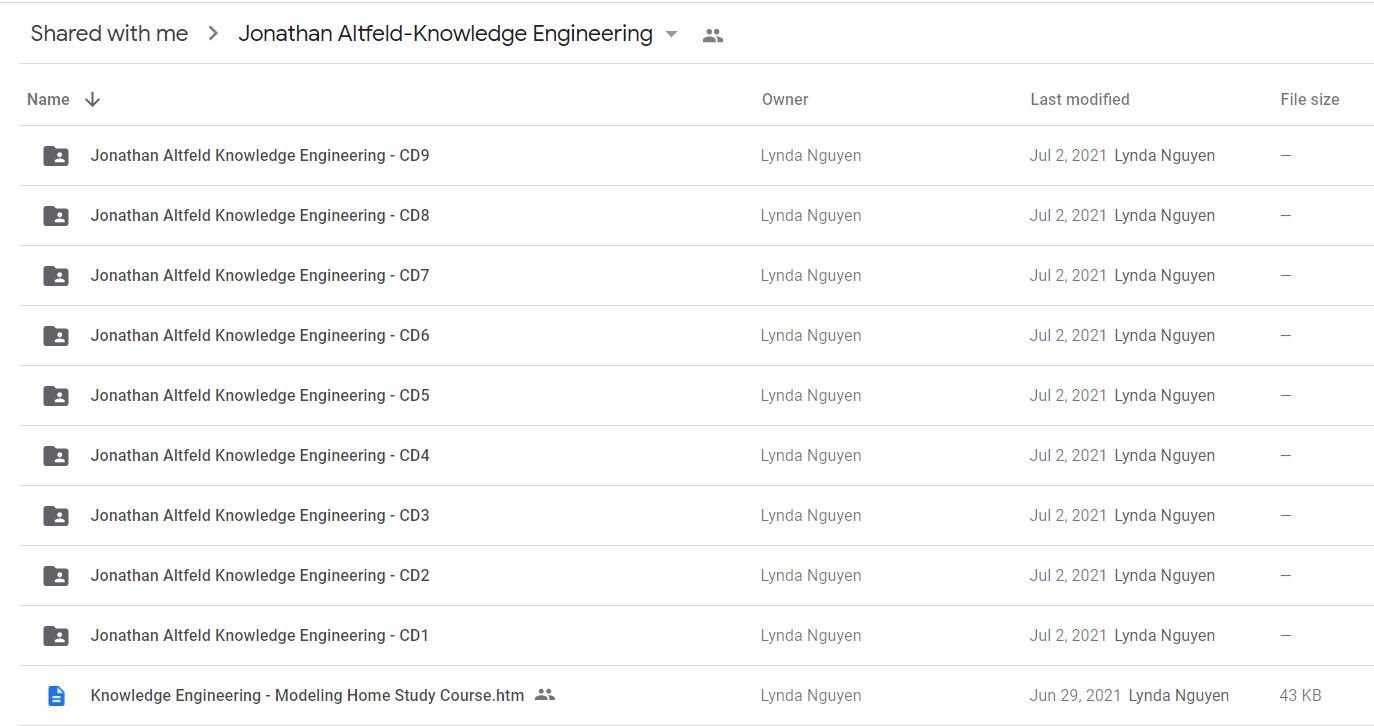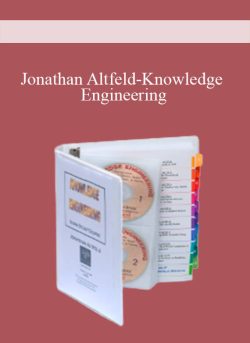Jonathan Altfeld-Knowledge Engineering
Instant Download: You will receive a download link via your order email immediately
Should you have any questions, please contact us:
Contents
 Jonathan Altfeld-Knowledge Engineering
Jonathan Altfeld-Knowledge Engineering
DESCRIPTION
Model the Expertise of others?
Reproduce whole Areas of Behavior?
Work with people’s -extensive- Belief Systems?
Ask yourself these questions first:
Have you not yet been able to develop sufficient Skills & Knowledge in these areas?
Have you enough skills but not the depth of intuition you think you need?
Announcing a new Home-Study-Course that will help enable you to…
Model other people’s Belief & Decision Systems with More Depth, Breadth & Accuracy than you would believe today, and help you to Intuitively Identify ways to Optimize those Systems.
Before I founded the Mastery InSight Institute, and before I immersed myself in Neuro-Linguistic Programming, I was a professional in the field of Artificial Intelligence. I did expertise-modeling professionally, almost exclusively for Fortune 500 companies. I was paid to interview business experts, find out what they knew, how they knew it, how they made the decisions they made, and then build software systems to reproduce those experts’ decision making processes.
I can just hear some of you thinking… “What? You mean the field of NLP doesn’t hold the only claim to modeling expertise? Blasphemy!”
The field of Knowledge Engineering closely parallels some of the skills taught through NLP. There are obvious differences, but certainly at the core of what constitutes the NLP technology & skillset is a set of tools to model human knowledge & subjectivity. That very description would sound highly familiar to those who do professional Knowledge Engineering. In many ways they are two parallel fields. Knowledge Engineering is about building software systems to behave & ‘think’ like human experts. In such a project, core software development team members would be tasked with acquiring knowledge from the experts, and then encoding that knowledge in a fashion that allows computers to reproduce the expert’s behavior consistently and fast! We can list more “similarities” between these two approaches to modeling than we can “differences.” But rest assured, both exist.
The Knowledge Engineer (KE) spends time interviewing & studying the experts, and learning directly from them. There are a variety of different methods which can be used to accomplish this, all grouped loosely under the term “Knowledge Acquisition.” Once a sufficient initial knowledge-base of modeled knowledge has been amassed, the KE then determines ways of storing/structuring/representing the expert’s knowledge, and then proceeds to build a software application known as an expert system.
NLP practitioners & master practitioners may recognize the above process as being highly similar to what is known as Modeling in NLP. This goes beyond strategy elicitation and is used to logically reproduce behavior in a given domain of expertise. Occasionally we hear people thinking of ‘reproducing a tennis swing’ or ‘matching/mirroring’ someone else’s behavior as ‘modeling.’ It isn’t, don’t let them oversimplify things. If they’re suggesting such things, they categorically don’t know what modeling is.
Do not allow others who suggest that if you (for example) learn to identify when someone’s in a particular Sensory Mode (like “Visual”), that you’re modeling. Such would be an injustice to you and to the process of modeling; that example is just a bit of “strategy elicitation” on a very small scale.
One (fallible but useful) rule of thumb might be that if it takes you at least several full-time AND efficient weeks or months, to acquire an area of expertise, then maybe you’re modeling. If it takes months for you to acquire the knowledge, integrate it into your unconscious mind, organize & optimize it, and then use it to reproduce expert behavior, then maybe you’re modeling. If you thought learning how to create rapport with “colored mental bubbles” was modeling, think again. It ain’t. At best that’s strategy elicitation. I once watched a trainer step into an “expert circle,” in which he said he imagined all the skills he wanted (but hadn’t actually elicited) into that circle, and he could feel what it was like to be the expert. As though if he said he was modeling a surgeon I would let him within a 3 mile distance of my friends or family needing medical assistance.
Give me a break!!! Modeling gets a “bad rap”
because of distortions & examples like that.
The question then becomes, would REAL modeling skills actually be useful to you?
So let’s look at some examples of real models at work.
Have you heard of the “Mega-Math” or “Mega-Memory” courses often advertised on television, as collections of genius strategies in particular areas of skill (math & memory skills)? Kevin Trudeau is making a boatload of money from sales of these (& other related) courses. He advertises globally; when visiting Australia in July 2000, his infomercials were being heavily tested there. Visit here to look at or purchase the Mega-Math or Mega-Memory courses.
Most of the “Real Estate” home-study-courses advertised through infomercials are examples of people who modeled their own skill (or someone else’s) at acquiring real estate with no-money-down. Someone helped them package that model in a way that makes it easy to learn.
The website http://www.sportsmind.com/au is an example of an NLP-trained person who modeled sports performance optimization, and now trains those skills to facilitators of his system.
The upcoming Persuasion Tactics Power Summit™ seminar is a Persuasion Tactics ‘model’ acquired by myself, from someone who is naturally a very persuasive individual, named Chris Tomasulo. Chris runs the “Accelerated Persuasion Newsletter.”
Find out for yourself what the CD’s in the course sound like.
The seminar from which this course was developed was recorded in Los Angeles in January 2001.
Proof Content

Delivery Method
– After your purchase, you’ll see a View your orders link which goes to the Downloads page. Here, you can download all the files associated with your order.
– Downloads are available once your payment is confirmed, we’ll also send you a download notification email separate from any transaction notification emails you receive from NLPlib course.
– Since it is a digital copy, our suggestion is to download and save it to your hard drive. In case the link is broken for any reason, please contact us and we will resend the new download link.
– If you cannot find the download link, please don’t worry about that. We will update and notify you as soon as possible at 8:00 AM – 8:00 PM (UTC+8).
Thank You For Shopping With Us!





![[Download Now] Elvea Systems – Mayan Book of Wisdom Extended](https://nlplib.com/wp-content/uploads/thumbs_dir/32-250x297-1-qit9087iie31iom2porypy3jnha36fz864aw0kx7ee.png)

![[Download Now] David Snyder – Attractivation](https://nlplib.com/wp-content/uploads/thumbs_dir/1-3-4-250x297-1-qit90kfez8jrpm4bqc244d0jdhluyibqjss796f35i.png)

